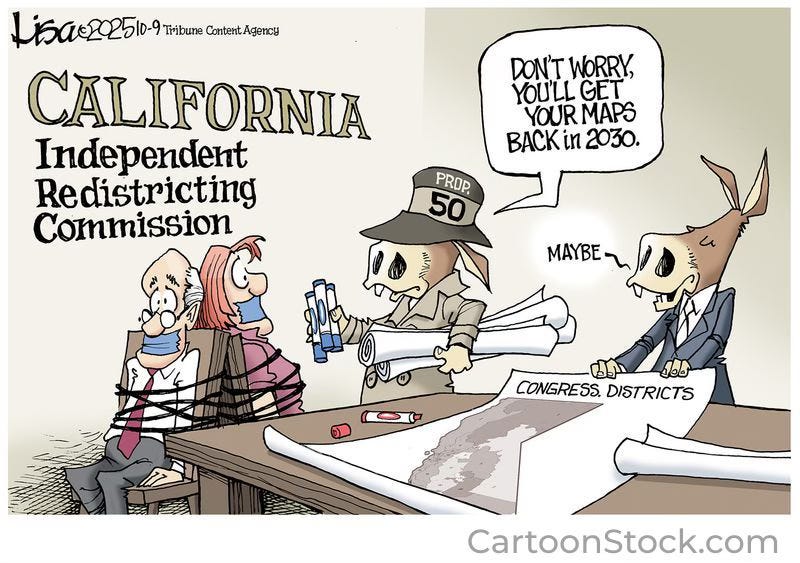Projection, Power, and Property Rights in Santa Barbara
In Psychology 101, students learn about projection—a defense mechanism where people accuse others of the very behavior they’re guilty of themselves. It’s a way to deflect blame while tightening their own grip on control.
In Santa Barbara, projection isn’t just a psychological concept. It’s public policy.
The Push for Control
Local officials claim they’re protecting tenants from exploitation. They accuse landlords of greed, manipulation, and destabilizing the housing market. But take a closer look: the policies they’re pushing—rent control, rent stabilization, eviction freezes, relocation payments—are classic examples of centralized control masquerading as compassion.
The City Council is trying to expand rent control and implement rent stabilization. These measures would force landlords to report private financial data to the government, limit their ability to adjust rents, and restrict how they manage their properties.
This isn’t regulation—it’s surveillance. It’s the slow erosion of property rights in the name of “tenant protection.”
The Real Cost of “Compassion”
The housing crisis wasn’t created by landlords. It’s the result of decades of poor planning, restrictive zoning, and bureaucratic dysfunction. Instead of addressing those root causes, local leaders are punishing housing providers—the very people keeping roofs over tenants’ heads.
Meanwhile, landlords are being squeezed from both ends. They face rising utility rates, new compliance costs like the SLIP program, and ever-growing regulation. These aren’t technically “rent increases,” but tenants still pay for them—through higher monthly rent. The irony? While rent hikes are capped, government fees and rates are not.
In many cases, landlords are even prohibited from adjusting rent to cover new government-imposed costs. The result? Deferred maintenance, reduced investment, and worsening housing conditions.
This isn’t just bad policy. It’s coercion.
That’s projection in action: accuse others of exploitation while engaging in it yourself.
Authoritarianism in a Friendly Disguise
Authoritarianism doesn’t always arrive with tanks and uniforms. Sometimes it walks into city council chambers, wrapped in well-meaning language and policy jargon.
It looks like:
Government-mandated rent ceilings
Forced data collection from private citizens
Restrictions on property rights
Retaliation against dissenting voices
These aren’t democratic ideals. They’re authoritarian impulses—centralized control, silenced opposition, and unchecked power.
Santa Barbara may not be a dictatorship, but the building blocks are there: unchecked authority, suppression of dissent, and the steady erosion of individual rights. Authoritarianism rarely starts with force—it begins with policy, paperwork, and the promise of protection.
Prop 50: A Statewide Power Grab
This November, California voters face Prop 50—a measure disguised as redistricting reform. In reality, it’s a Trojan horse that shifts power from independent citizen commissions back to politicians.
If passed, Prop 50 would:
Let lawmakers redraw their own districts
Undermine public transparency
Invite gerrymandering and voter manipulation
Erode democratic checks and balances
This isn’t reform—it’s regression. A step toward governance where the powerful rewrite the rules to stay in power.
Vote NO on Prop 50.
Speak Now—or Be Ruled Later
If you care about property rights, transparency, and real solutions to the housing situation, now’s the time to act. Speak at public meetings. Submit comments. Challenge the narrative. And most importantly—vote.
When projection becomes policy, and overreach is rebranded as compassion, the damage isn’t just psychological—it’s structural.
Santa Barbara deserves leadership that solves problems, not deepens them.
Vote NO on Prop 50. Reject projection. Defend your rights.
Remember Measure I
If you missed Tuesday’s Finance Committee meeting, be sure to tune in next Tuesday, October 21st, for the continuation.
Now they’re asking for even more of our money — because they say they still can’t keep the libraries open.
But here’s the thing:
That’s exactly what Measure I was supposed to help fund.
Passed by voters in November 2024, Measure I was a ½-cent sales tax increase projected to generate about $15.6 million annually for Santa Barbara’s General Fund.
According to the official ballot language and city press releases, Measure I was intended to help:
Maintain 9-1-1 emergency/fire/paramedic/police response
Keep neighborhood fire stations open
Improve housing affordability and address homelessness
Keep public areas and parks clean and safe
Maintain library services
Provide stormwater protection
Prepare for natural disasters
Retain local businesses and jobs
The city emphasized that Measure I funds would be used locally, with mandatory audits and public disclosure.
So, if Measure I passed less than a year ago and was supposed to help maintain library services, why are we now being told the city doesn’t have the money to keep libraries open — and needs to raise even more?
Maybe it’s time to start asking some tough questions:
Where is the $15.6 million in new tax revenue going?
Why are core services like libraries still on the chopping block?
Is the City prioritizing spending responsibly — or just asking for more without accountability?
Finance Committee | City of Santa Barbara
Next Meeting: Tuesday, October 21st
Remember, City Finance Director Keith DeMartini and his department staff only do what the City Council tells them to do. They have come to council with the projected deficit, yet council continues to spend, spend, spend.
Talking About Spending
The City Council has repeatedly been warned about the high costs of implementing rent registries and rent stabilization—but they’ve chosen to ignore the data. Their policies over the past seven years have directly contributed to the massive rent increases we’re seeing today by placing unsustainable burdens on housing providers.
Meanwhile, the city has allowed BCycle to operate a private bike rental business on our public streets and sidewalks—rent-free for five years. Yet now, they’re coming after everyone—not just landlords—to generate revenue and cover a growing budget deficit. (Watch Finance Committee next Tuesday)
We’ve already endured two tax increases, and the city is still projecting a massive shortfall. Instead of tightening spending or charging commercial operators like BCycle, they’re reaching deeper into the pockets of residents, renters, and property owners alike.
And let’s not forget: staff time isn’t free. Every hour spent on rent registries, redistricting schemes, and failed experiments like the State Street Promenade is taxpayer funded. Millions have already been wasted on consultants, redesigns, and endless studies—while our libraries face cuts and basic services are strained.
If the city wants to save money and restore vitality downtown, there’s a simple solution: Cancel the Promenade. Open State Street. Stop leading us deeper into deficit.
Credit where it’s due: Mayor Rowse and Councilmembers Jordan and Friedman have consistently voted against these rent-hiking and revenue-grabbing measures. Remember that when it’s time to vote.
•••
Harbor & Seafood Festival
Don’t forget: the 22nd Annual Harbor & Seafood Festival is happening tomorrow Saturday, October 18, from 10 am to 5 pm. Santa Barbara Harbor & Seafood Festival | City of Santa Barbara
Paid Advertisement:
Click here to support Bob Smith!
Community Calendar:
Got a Santa Barbara event for our community calendar? Fenkner@sbcurrent.com






Yay, Bonnie! Trump should appoint you to his CA team with Bill Essayli rounding up the crooks who stole from the homeless fund. https://www.thegatewaypundit.com/2025/10/trump-appointed-u-s-attorney-california-begins-investigating/
Liberate libraries. Last year the top two librarians were paid to not come to work. This year the top one was paid $500,000 through a Non-Disclosure Agreement; ie, taxpayer money paid so the top librarian would go away quietly and not tell us who did what to her. Who authorized that payment? A new librarian was just hired at a $281,000, a $40,000 raise over the departing one. Liberate libraries from these types of treatments and expenses.